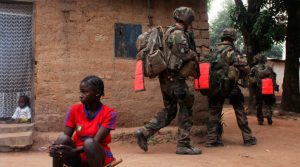Post written by Rebecca King, J.D. expected May 2018, Elisabeth Haub School of Law at Pace University.
In war torn nations,  where the citizens are at their most vulnerable, reports of sexual abuse and exploitation are plentiful. At first, it may not be that surprising that this type of abuse has been reported in such highly unstable nations. However, the perpetrators are not the stereotypical sexual criminal most of us imagine; rather, the abusers in this case are the very people who have been sent to these victims’ communities to help rebuild and stabilize their lives. The abusers are the United Nations’ Peacekeepers.
where the citizens are at their most vulnerable, reports of sexual abuse and exploitation are plentiful. At first, it may not be that surprising that this type of abuse has been reported in such highly unstable nations. However, the perpetrators are not the stereotypical sexual criminal most of us imagine; rather, the abusers in this case are the very people who have been sent to these victims’ communities to help rebuild and stabilize their lives. The abusers are the United Nations’ Peacekeepers.
Starting in December of 2012, the Central African Republic faced a series of attacks by a mainly Muslim rebel coalition, which eventually resulted in President François Bozizé fleeing the capital. The UN estimated that over 2.5 million people were in need of humanitarian aid in the Central African Republic at the time. In April of 2014, the UN Security Council created the Multidimensional Integrated Stabilization Mission in the Central African Republic (MINUSCA) to aid with the transition process in the Central African Republic, to reestablish State authority and institutions, acting under Charter VII of the UN Charter.
It was not long before reports of sexual abuse by Peacekeepers surfaced. The first reports indicated that the sexual abuse occurred before and after MINUSCA was established, between December of 2013 and June of 2014. It is alleged that French Peacekeepers sexually abused at least 10 displaced boys, some of them orphans, at the M’Poko airport in Bangui, which was being used as a center for internally displaced people. The children who disclosed the abuse described how they approached the peacekeepers looking for food.
A confidential internal report entitled, “Sexual Abuse on Children by International Armed Forces,” was passed to officials in the Office of the High Commissioner for Human Rights in Geneva (OHCHR). When nothing was done to address the rape and sodomy of these orphan children, Anders Kompass, Director of Field Operations for the OHCHR, leaked the report to the French Authorities. Kompass was initially suspended for breaching UN protocol by leaking the confidential report. The United Nations Dispute Tribunal has since reinstated him, after finding that his suspension was unlawful.
Since the UN does not have the power of criminal investigation and prosecution, the member states where the accused troops are from choose the disciplinary action that will be taken. In this case, the French officials took over the investigation. On January 5, 2017, three French Judges decided not to request any charges be brought against the French Peacekeepers, because investigators were not able to “materially corroborate” the allegations.
This brings us to the problem that the UN faces. There is often impunity in these sort of cases, because the UN cannot criminally prosecute the abusers themselves. The sexual abuse that allegedly occurred in early 2014 at the M’Poko airport is far from an isolated incident. The UN has previously experienced backlash for its failure to act over pedophile rings in the Democratic Republic of Congo, Kosovo, and Bosnia, as well as for allegations of sexual misconduct by its peacekeepers Burundi, Haiti, and Liberia. In an attempt to hold peacekeepers accountable for any sexual abuse they commit, the UN Security Council adopted Resolution 2272 in March of 2016, which implements a zero tolerance policy. Specifically, the resolution requires that if allegations of sexual exploitation or abuse arise, and the nation that contributed those troops has not taken appropriate measures to hold the troops accountable, that troop-contributing country must replace all military units and peacekeepers in the operation where the allegation arose.
There was a great amount of support for this resolution not only in the Security Council, but also from high officials within the UN. The resolution passed with 14 votes in favor and none against, with Egypt abstaining. Secretary General Ban Ki-moon expressed his approval of the resolution. His spokesperson stated, “[T]he Secretary-General’s focus is to make a difference for the victims, ensuring protection and support for victims, and to demand zero impunity.”
However, it is difficult to ignore the circumstances that led to the adoption of this resolution. It was only after Kompass leaked the confidential report that the UN took action to address the sexual abuse of orphan children in the Central African Republic. Even then, the UN disciplined Kompass for not following protocol. While the Security Council has finally decided to take action to address this atrocity, and the Secretary General ensures that the focus is on the wellbeing of the victims, it is difficult to believe that the UN is fully committed to eradicating this problem. It is especially difficult when considering that the UN Committee on the Rights of the Child issued a report in early 2014 greatly criticizing the Vatican’s policies of secrecy which permitted priests to continue abusing children. Yet, when the UN themselves received reports, that same year, of peacekeepers committing sexual exploitation and abuse in Central African Republic, they chose not to take any action. While the resolution the Security Council adopted in March of 2016 is a step in the right direction, it cannot erase the harm and hypocrisy that resulted from the UN’s prior failure to act.